When it comes to building an e-commerce store, choosing the right platform is essential for ease of use and customization, as well as its search engine optimization (SEO) capabilities. If you’re considering such a platform for your store, you’re likely wondering whether Shopify is good for SEO.
This question is important because SEO determines your store’s ability to rank high in search engine results and attract organic traffic. But does Shopify provide the tools and features needed for you to succeed in the competitive world of e-commerce SEO?
This article provides a comprehensive overview of the specified platform and SEO, highlighting both its advantages and areas where it may have certain limitations. We’ll also look at how Shopify stacks up against other popular virtual systems like WordPress, Wix, and Magento to help you choose the right one for your business.
How Shopify performs for SEO — the benefits
Shopify has built a solid reputation as an easy-to-use, functional space for creating visually appealing online stores. But the big question is: when it comes to SEO, how well does the platform perform? Let’s look into its features and major benefits.
Built-in SEO-friendly features
Shopify has several built-in capabilities that make SEO easier for store owners, especially those without deep technical expertise. These features automatically optimize your store and help improve its chances of ranking higher in search results. Among them are:
- Metadata Customization. You can easily edit title tags, meta descriptions, and product descriptions — all essential for SEO. Optimizing these elements with relevant keywords improves visibility and ensures your store matches what customers are searching for.
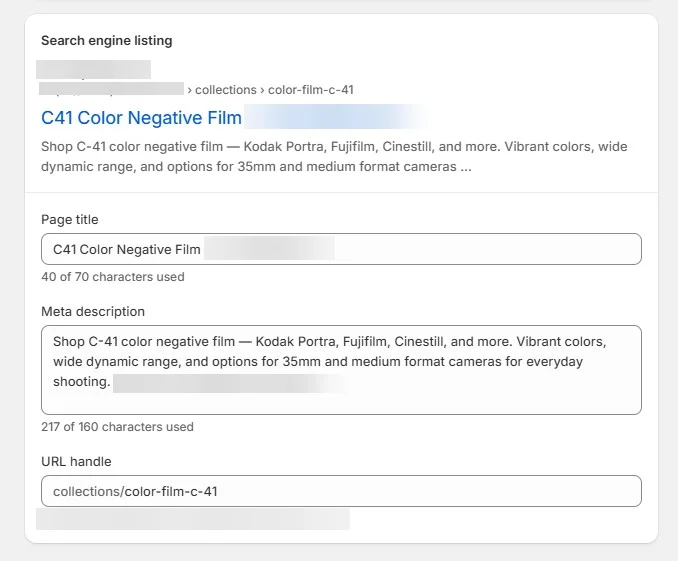
- Sitemap Generation. Shopify automatically builds a sitemap for your store, helping search engines find and index key pages. This structured file guides crawlers through your content so nothing important gets overlooked. For practical tips on improving your sitemap, see our guide: Best Sitemap XML Optimization Practices for SEO and Google.
- Optimized Images. The platform also compresses product images by default, improving page load speed — a known Google ranking factor. Faster sites provide a better user experience and stronger SEO performance.
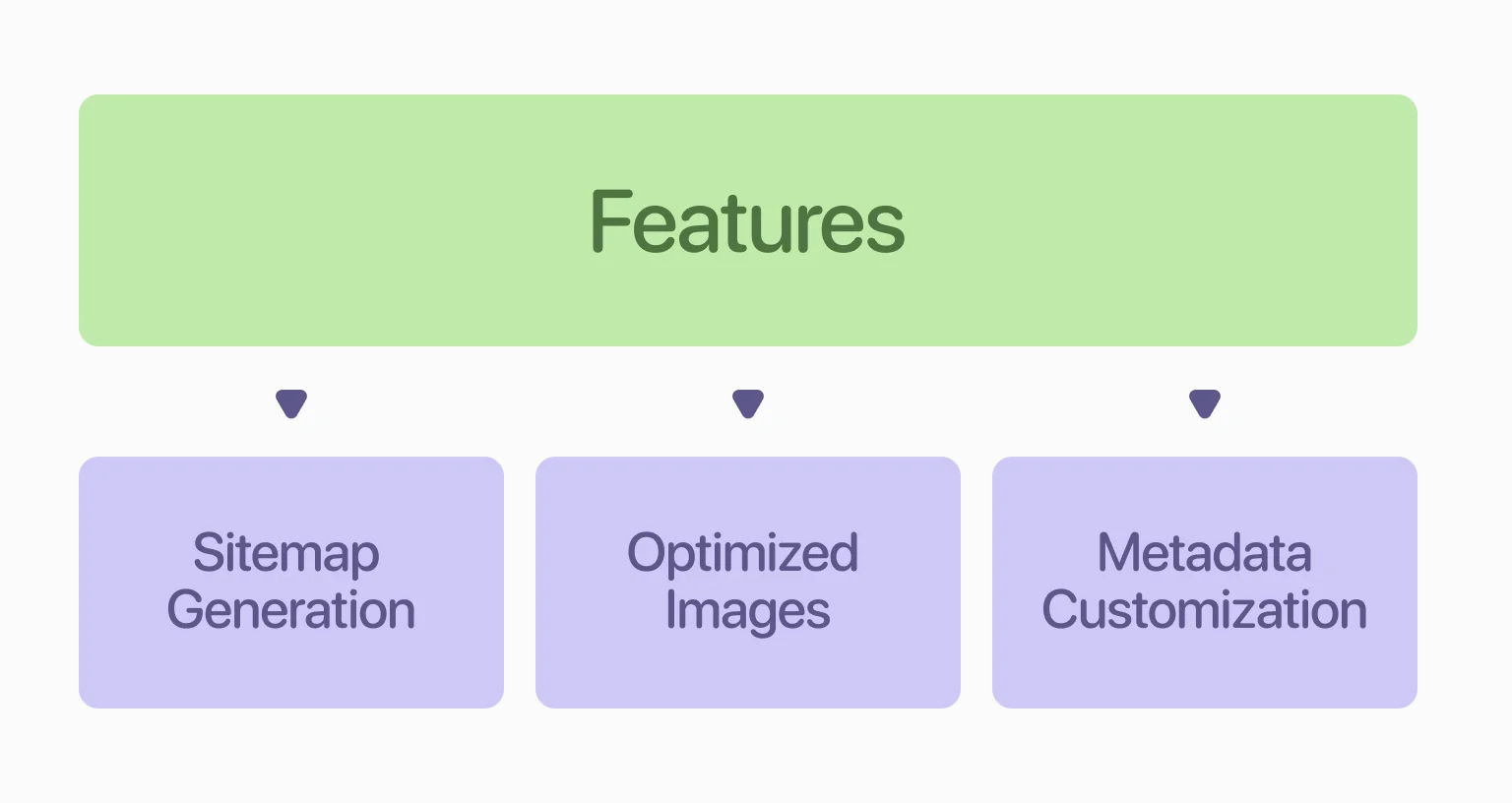
Additionally, you can control how search engines crawl your site through the robots.txt file, ensuring that bots focus on the relevant pages. If you’re unsure how to configure it, read our detailed guide on robots.txt.
These built-in features are a strong foundation, but many Shopify stores still face issues like crawl errors, duplicate pages, or slow loading times. Fixing them requires deeper SEO knowledge. Our technical SEO services help identify and resolve such problems, ensuring your store runs smoothly, loads quickly, and ranks where it should.
Shopify’s technical advantages
Regarding SEO for Shopify stores, the platform’s technical infrastructure plays a crucial role. The good news is that the mentioned e-commerce space handles most of the technical aspects of SEO for you. Understanding of Shopify’s advantages will help you make the most out of the platform. Below are these benefits listed.
- Fast Server Speed. The platform’s infrastructure is designed to ensure quick loading speeds. With reliable servers and fast rendering times, Shopify makes it easy to optimize your website’s performance, even as the store grows.
- Secure Platform. Shopify comes with SSL certificates for all stores. Security plays a role in SEO because Google favors protected websites and may rank them higher in search results.
- Automatic 301 Redirects. If you ever change a product URL or remove a page, Shopify automatically handles 301 redirects. This helps guide both users and search engines to the correct destinations, avoiding broken links and maintaining your site’s SEO strength.
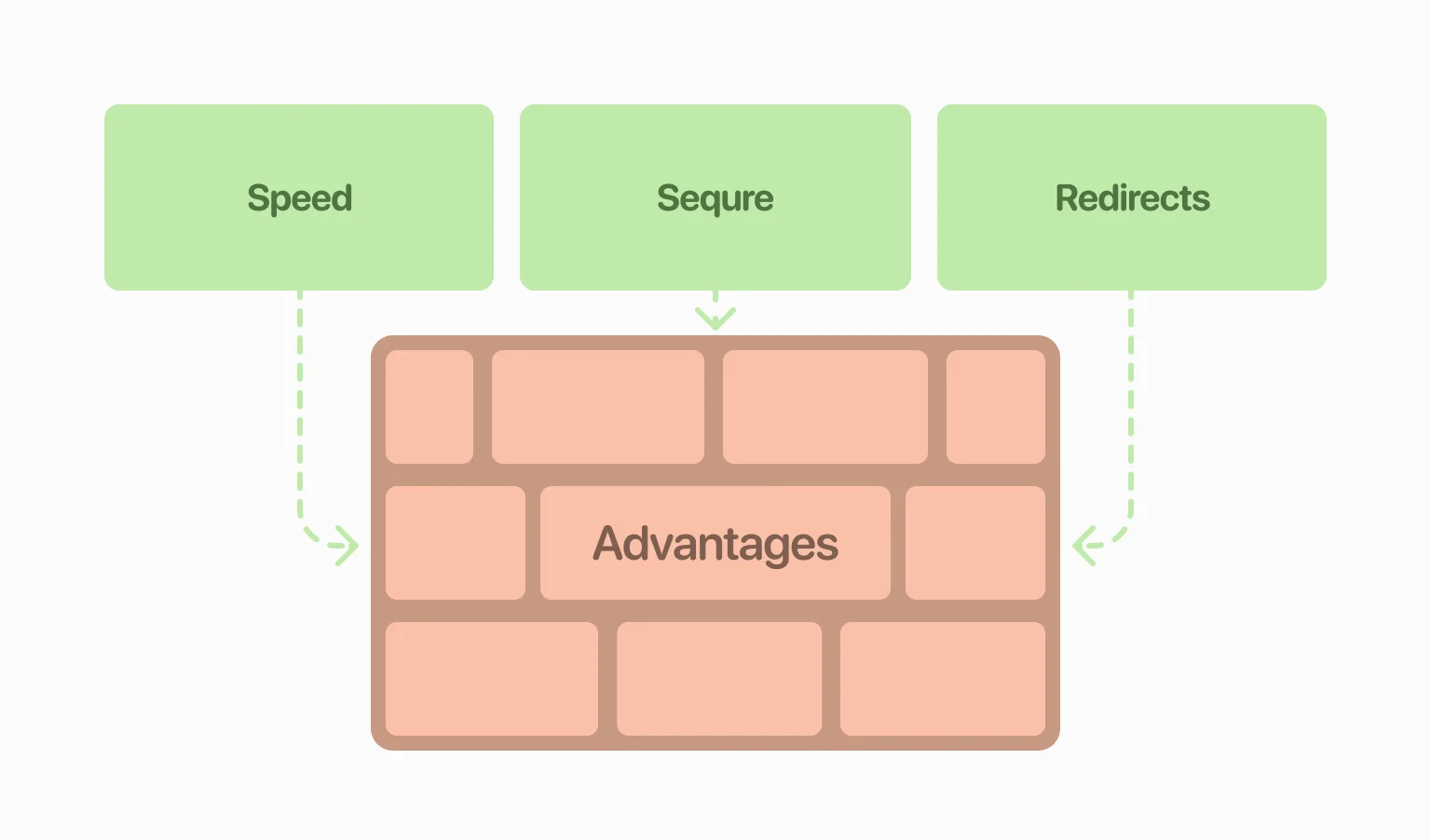
While these features cover the basics, they don’t catch everything. Issues like bloated code, theme conflicts, or unoptimized scripts can still affect your site’s speed and search visibility. A professional audit can uncover and fix such problems. Our technical audit services provide a detailed review and tailored recommendations to ensure your Shopify store performs at its best.
Beginner-friendly SEO setup
One of Shopify’s biggest advantages is how easy it is for newcomers to get started with SEO. Platforms like Magento, WooCommerce, and PrestaShop often demand more technical knowledge, but Shopify keeps things simple. And here’s why:
- User-Friendly Interface: Shopify’s dashboard is intuitive and user-friendly. Whether you’re uploading new products, adjusting your metadata, or analyzing SEO reports, you won’t need advanced coding skills to make the most of these features.
- SEO Guidance: The platform offers a range of beginner-friendly resources, including tools, how-to guides, and tutorials. Everything mentioned above is laser-focused on SEO. The specified resources make it easier for new store owners to grasp essential web page optimization concepts and start refining their sites with confidence.
- App Integrations: Shopify offers various SEO apps, allowing you to automate tasks such as image optimization, metadata editing, and more. These solutions are available in the platform’s online store. Apps like TinyIMG can help streamline your SEO efforts and optimize the site without manual work.
Shopify SEO limitations you should know
Although Shopify offers many advantages, there are also built-in restrictions that can affect SEO if not properly addressed. Being aware of them early allows you to plan effective workarounds. The key ones to watch out for include:
- Shopify’s forced URL structure. Shopify’s rigid URL structure is a common SEO drawback. Unlike WordPress, it automatically includes “/collections/” and “/products/” in your URLs, which can’t be removed or altered. While not directly harmful to rankings, this limited customization can make it harder for search engine crawlers to understand your site’s hierarchy, especially as your store grows.
- Limited access to server logs. Unlike self-hosted platforms like WordPress, Shopify doesn’t give you access to server logs, which are crucial for diagnosing and fixing technical SEO issues. Without server logs, it’s harder to track search engine bots’ crawling behavior, which can lead to issues being overlooked.
- Harder to implement advanced structured data. Shopify’s default structured data implementation is basic. While Shopify automatically adds some schema markup, for more advanced features, such as custom schema for reviews, products, or other content types, you will need third-party apps or custom code.
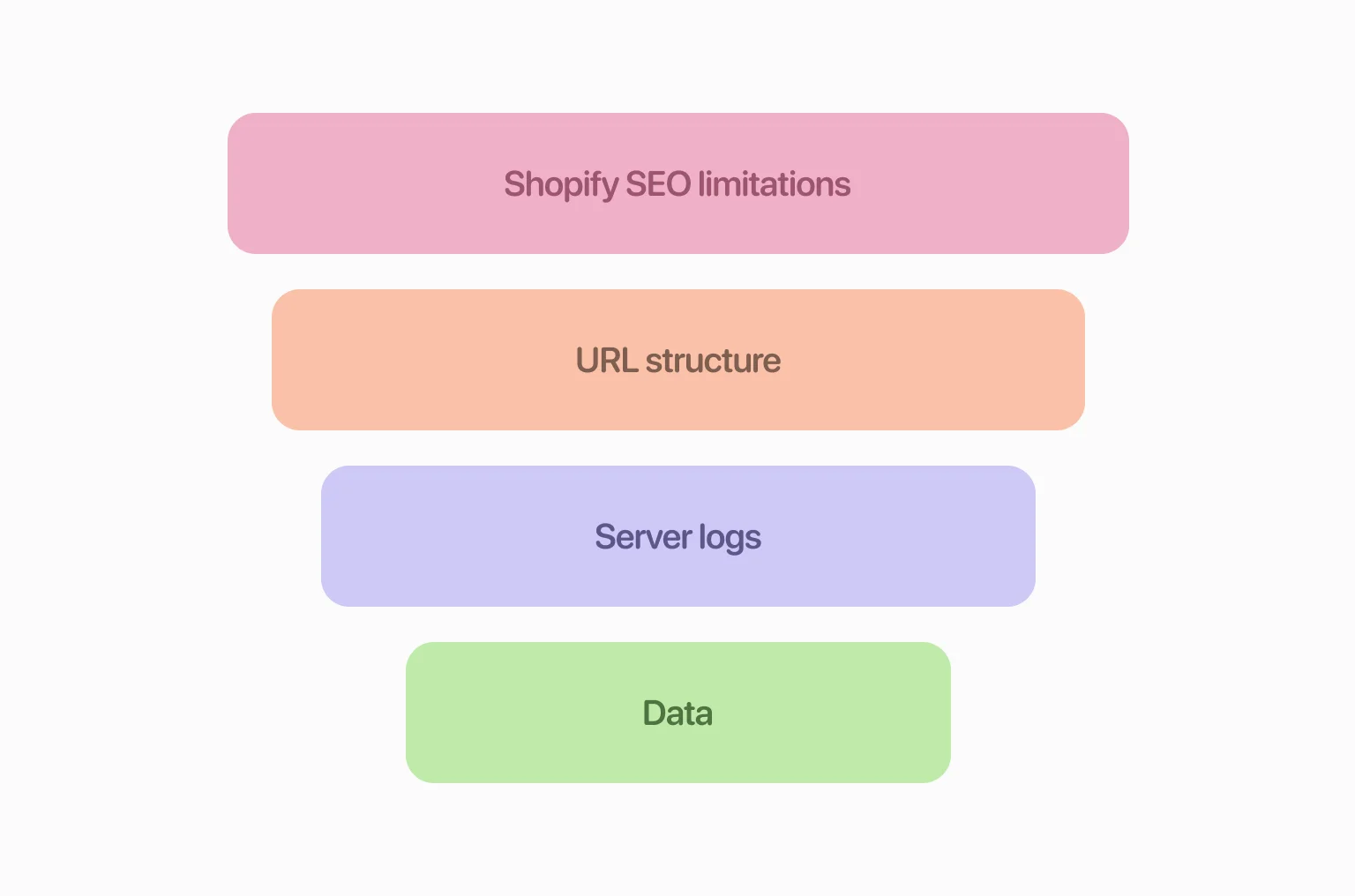
If you’re not familiar with the complexities of SEO, these limitations can be hard to overcome and may hinder your store’s growth. Our SEO consulting services can help identify the best strategies to tackle these challenges. We offer customized solutions that ensure your Shopify store is optimized for long-term success and better search engine performance.
Shopify vs. other CMS platforms for SEO
When evaluating Shopify’s SEO performance, it’s helpful to compare it to other CMS platforms to understand its strengths and weaknesses. As such, let’s see how Shopify compares to other popular platforms like WordPress, Wix, Squarespace, Magento, and BigCommerce.
Shopify vs. WordPress
WordPress is known for being highly SEO-friendly, giving users full control over their optimization approach and access to popular tools like Yoast SEO for enhancing on-page content.
- Pros of WordPress. It offers better flexibility with URL customization, and the ability to install various SEO plugins gives you complete control over on-page SEO, metadata, and more. Plus, WordPress supports powerful blogging capabilities, which are crucial for content marketing and SEO.
- Cons of WordPress. Unlike Shopify, WordPress is a self-hosted platform, meaning you have to manage hosting, security, and technical aspects yourself. This requires a higher level of expertise.
While Shopify is easier to set up and use, WordPress is the more customizable choice for those who need full control over their SEO strategy.
Shopify vs. Wix
Wix is a beginner-friendly website builder that makes it easy to create visually appealing sites, but it does have some limitations when it comes to SEO.
- Pros of Wix. It offers a simple drag-and-drop editor and comes with basic SEO tools already built in, making it a good option for beginners. Users can also adjust key SEO elements such as meta titles, descriptions, and page URLs.
- Cons of Wix. Wix’s SEO features are limited compared to Shopify, especially for larger stores. The URL structure and the inability to use certain third-party SEO tools may restrict the optimization options available to users.

Compared to Wix, Shopify offers a stronger SEO setup tailored for e-commerce, making it a better fit for online sellers who want to grow their store’s visibility.
Shopify vs. Squarespace
Squarespace is an all-in-one website builder that offers a visually appealing design, but its SEO features are more basic than Shopify’s.
- Pros of Squarespace. Squarespace offers a sleek interface and easy setup, making it a good option for personal sites and small businesses. It provides automatic mobile optimization, SSL security, and basic SEO options.
- Cons of Squarespace. Like Wix, Squarespace offers limited flexibility, especially in terms of SEO, as it lacks advanced optimization features and doesn’t allow integration with third-party SEO tools.
For those running an e-commerce store, Shopify offers more specialized tools for SEO optimization.
Shopify vs. Magento
Magento is a powerful CMS used primarily by large enterprises, known for its flexibility and scalability. However, it’s more complex than Shopify and requires technical expertise to optimize for SEO fully.
- Pros of Magento. Magento gives you complete control over your site’s SEO, allowing you to customize URLs, metadata, and more. It also has robust multi-store functionality and is highly scalable.
- Cons of Magento. Unlike Shopify, Magento requires significant technical expertise to manage. It can be difficult for beginners, and the platform’s complexity may slow down the setup process.
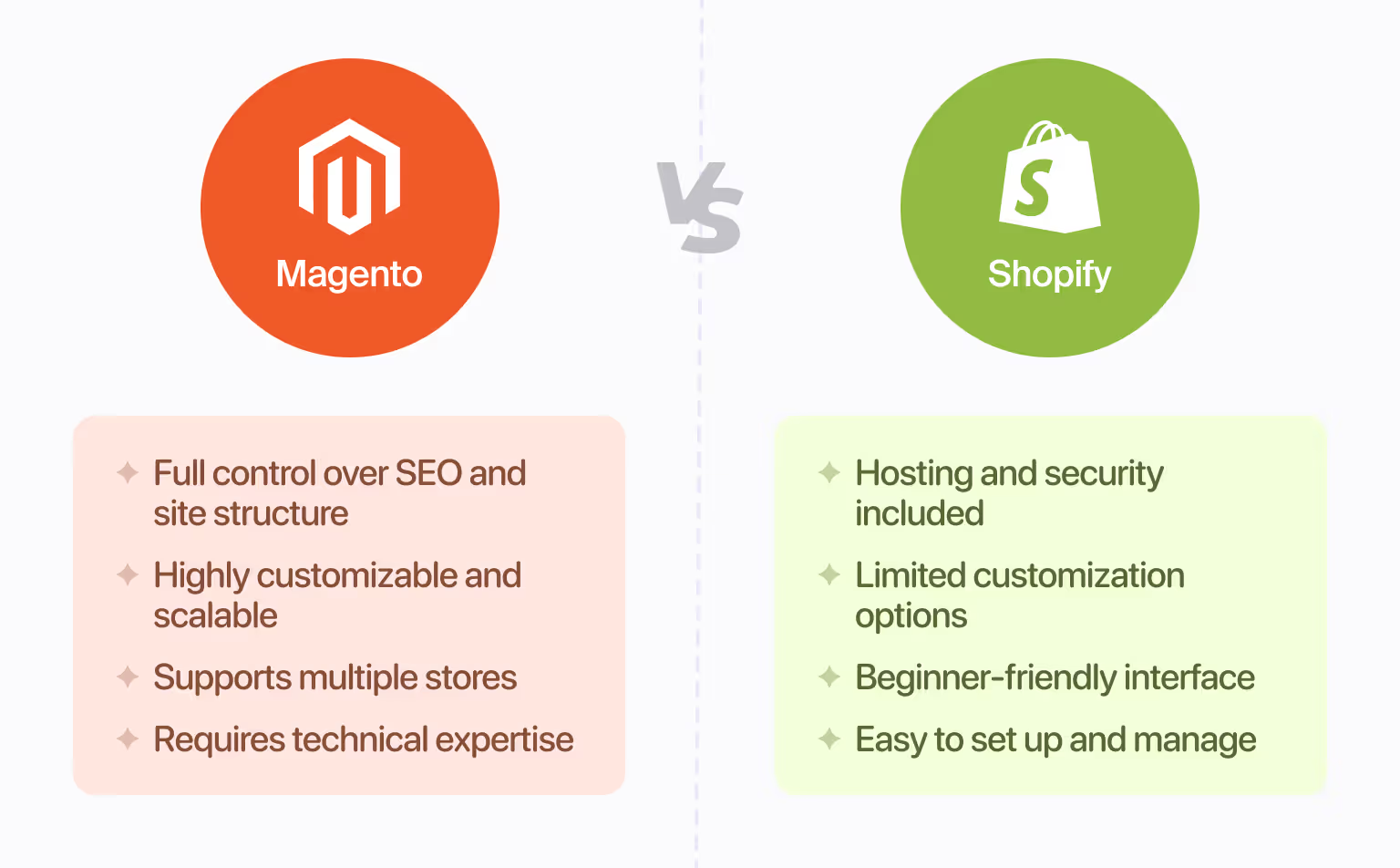
Shopify, in contrast, is much easier to use, with a more beginner-friendly setup. However, Magento excels when it comes to high-volume stores with extensive customization needs.
Shopify vs. BigCommerce
BigCommerce is a well-known e-commerce platform that’s frequently compared to Shopify. It offers similar functionality, but the key differences lie in pricing and scalability.
- Pros of BigCommerce. BigCommerce offers built-in SEO features like metadata customization, product filtering, and URL editing. It also provides advanced SEO tools for large businesses.
- Cons of BigCommerce. Like Magento, BigCommerce has a steeper learning curve than Shopify and requires more technical expertise to optimize the platform entirely.
While BigCommerce offers more customization for larger businesses, Shopify remains the easier, more accessible choice for those seeking a straightforward SEO solution.
Which platform is right for SEO?
To help you compare platforms fairly, we evaluated them based on key SEO criteria: URL customization, metadata control, sitemap generation, speed performance, and blogging capabilities.
Choosing a platform largely determines the starting positions of your online business, which is why this issue is so important.
How to maximize SEO on Shopify
While Shopify provides a solid foundation for SEO, optimizing your store requires ongoing effort and effective strategies. To help you boost your rankings and overall SEO performance, here are a few key areas to focus on.
Maximizing SEO on Shopify requires ongoing effort to optimize key factors like site speed, content, and the use of SEO apps.
Optimize site speed and core web vitals
Site speed is a crucial factor for SEO, and Shopify provides a good base by hosting stores on reliable servers. But there are additional steps you can take to improve your site’s speed further. Compressing images, using fast-loading themes, and minimizing JavaScript can help improve your website’s Core Web Vitals, which are used by Google to rank sites.
A faster website ensures a better user experience, lowers bounce rates, and boosts your store’s ranking. If you’re seeking step-by-step instructions to enhance speed, structure, and SEO performance, check out our detailed guide: Shopify SEO Optimization Guide to Boost Your Store’s Visibility.
Essential Shopify SEO apps and tools
Shopify has an extensive app marketplace that offers a variety of tools designed to enhance your SEO efforts. The right apps help automate routine tasks, improve site performance, and provide insights you might otherwise miss. For example:
- TinyIMG. This app streamlines image optimization for both speed and SEO, helping to reduce loading times while maintaining high visual quality.
- SEO Booster. This app offers automated metadata management, backlink tracking, and SEO reporting. It’s perfect for beginners who need a more hands-off approach to SEO.
- Plug in SEO. This tool helps you identify and resolve SEO problems on your Shopify store quickly and easily. Also, it offers guidance on how to improve your SEO score and ensures you stay on track.
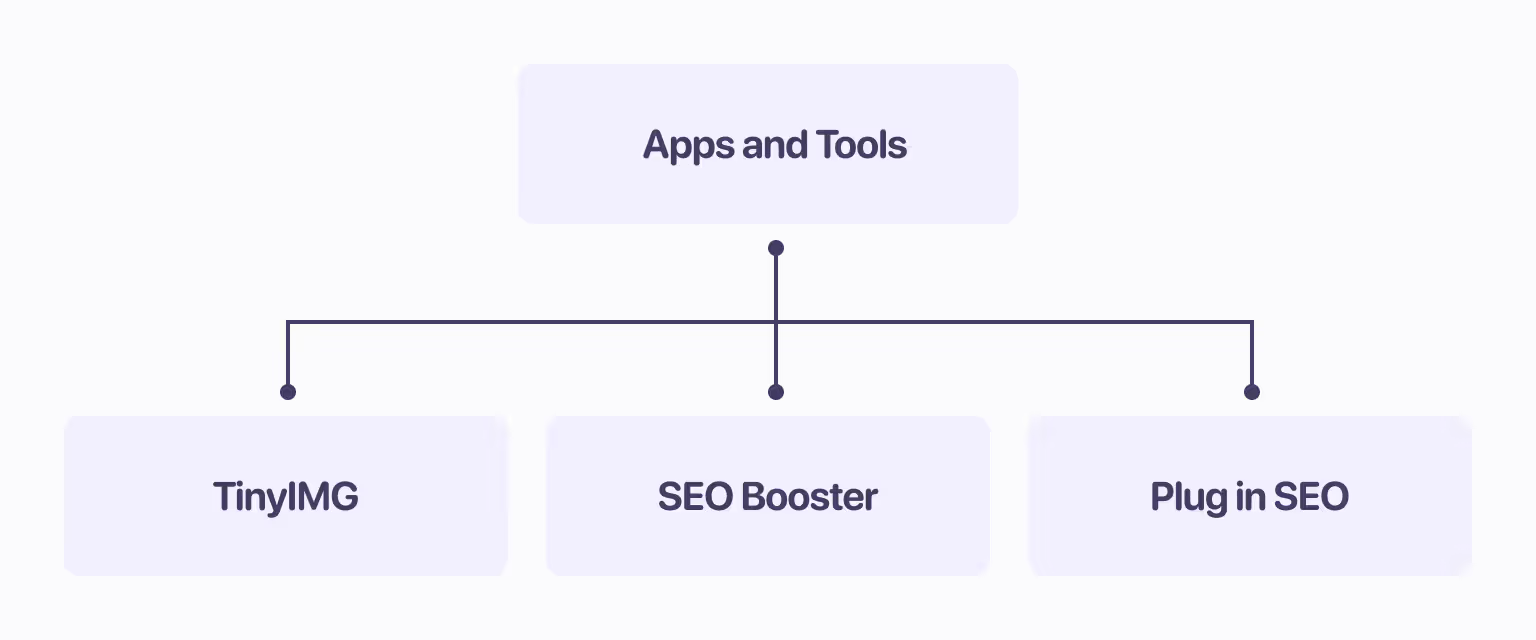
By integrating these apps into your workflow, you can significantly improve your Shopify store’s SEO without having to worry about manually performing every task.
Content and link building on Shopify
Content is king in the world of SEO. For your Shopify store to perform well in search engine results, you need high-quality content that answers your customers’ questions and attracts backlinks from reputable sites. Here are three proven approaches:
- Create Engaging Product Descriptions. Unique, compelling product descriptions not only help with conversions but also improve your SEO. Incorporate relevant keywords naturally to help your products appear in relevant searches.
- Start a Blog. While Shopify’s blogging features are somewhat limited, it’s still a great idea to create high-quality blog content. Blogging lets you target long-tail keywords, strengthen your SEO, and build your brand’s credibility within your niche.
- Build Backlinks. Earn Backlinks. Reach out to bloggers, influencers, and industry sites to gain valuable links to your store. Quality links from reputable sources help demonstrate your store’s credibility and relevance to search engines.
<div class="post__style-link">To put these tactics into practice effectively, it helps to follow a structured plan. Our guide on SEO content strategy explains how to build one step by step.</div>
Handling duplicate content and URL issues
Duplicate content is a frequent SEO challenge for Shopify stores, often caused by product URLs and page variations. The platform can unintentionally generate multiple versions of the same page, which may confuse search engine crawlers and impact indexing accuracy.
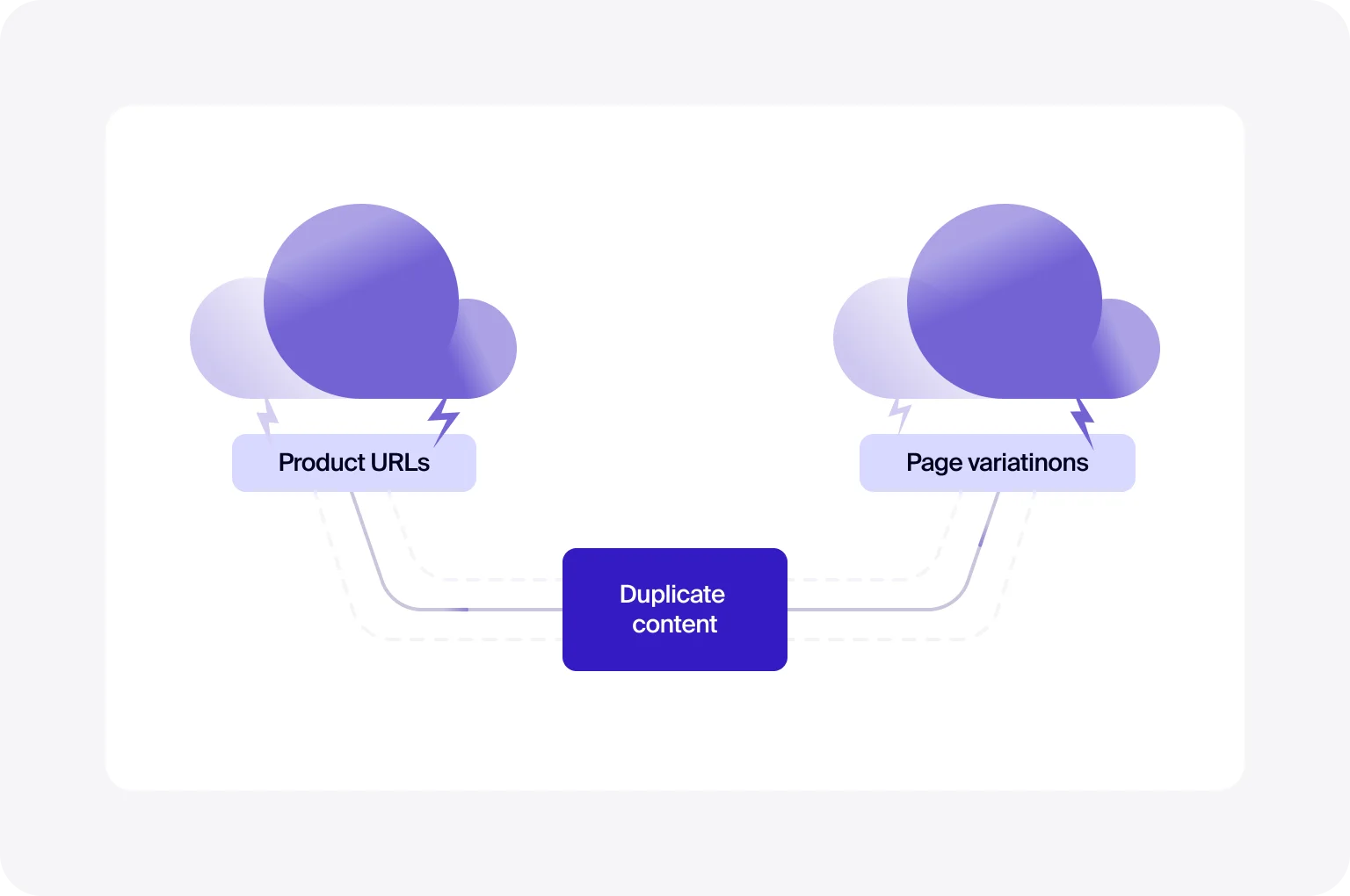
Common scenarios to watch for:
- Duplicate Product Pages. Shopify might generate duplicate product pages through category pages or tags. To avoid this, ensure your canonical tags are correctly set to point to the main product page.
- URL Optimization. Shopify’s forced URL structure can also lead to duplicate content. For example, if you add the same product to multiple collections, you might get different URLs pointing to the same page. Implement 301 redirects to merge link authority and avoid potential SEO problems.
<div class="post__style-link">Check out our SEO audit checklist to stay on top of any duplicate content or URL issues and fix them before they impact your rankings.</div>
Can Shopify stores actually rank well?
A common concern for those considering Shopify is whether or not stores built on the platform can achieve high rankings in Google’s search engine results pages (SERPs). The answer is yes — Shopify stores can rank well, but success depends on how effectively you optimize your store.
While Shopify provides a solid foundation for SEO, the key to ranking well lies in continuous optimization and strategic content creation.
Examples of Shopify sites dominating SERPs
Several high-traffic Shopify stores have proven that Shopify can support effective SEO strategies. Some notable Shopify stores that have achieved excellent rankings include:
- Allbirds. Known for its eco-friendly shoes, Allbirds runs on Shopify to support global e-commerce operations and rapid scaling. Their focus on optimized product pages and storytelling has helped them build strong visibility around sustainable fashion.
- Gymshark. This fitness apparel brand also grew rapidly after migrating to Shopify Plus. By combining a robust platform with targeted SEO tactics such as blog content and backlinks, Gymshark ranks for highly competitive fitness keywords.
These examples show that with the right strategy, Shopify can compete at the highest level in organic search. Yet many store owners struggle to replicate such results without the necessary expertise or resources. Our e-commerce SEO services are designed to close that gap, helping you turn proven tactics into measurable growth in traffic, conversions, and rankings.
Platform vs. strategy — what really matters?
Shopify offers strong SEO foundations, but tools alone won’t get you far. Many store owners install a few apps, tweak some metadata, and hope for rankings — only to see limited results. What separates successful stores from the rest is a clear, long-term SEO strategy.
A winning strategy involves defining how your content will target search intent, how authority will be built through links, and how your store’s technical health will be maintained over time. Shopify can support all of this, but it won’t make the decisions for you. In the end, the platform provides the capabilities, but strategy turns them into measurable growth.

Should you choose Shopify for SEO?
Shopify strikes a strong balance between usability and SEO features, making it an excellent choice for small to mid-sized businesses, startups, and non-technical teams that want to get online quickly. Its intuitive design, built-in tools, and rich app marketplace provide everything needed to establish a solid SEO foundation.
For larger enterprises or stores with advanced SEO requirements, Shopify’s limitations, such as rigid URL structures and limited flexibility in content management, may present challenges. These can often be addressed with the right expertise, but they do require more planning.
Ultimately, Shopify is good for SEO, but the real difference comes from how you approach it. With a structured strategy, ongoing optimization, and the right support, the platform can deliver strong visibility and long-term growth.
in your mind?
Let’s communicate.

Frequently Asked Questions
Is Shopify SEO friendly?
Yes, Shopify is SEO-friendly, offering built-in tools like metadata customization, automatic sitemaps, and speed optimization.
Does Shopify rank worse than WordPress?
While Shopify offers a solid foundation for SEO, WordPress provides more flexibility and control over your SEO efforts.
Do you need SEO apps for Shopify?
Shopify has built-in SEO tools, yet simultaneously, apps like TinyIMG and SEO Booster can help automate tasks, improve site speed, and optimize metadata.
How to fix Shopify duplicate content issues?
You can fix duplicate content issues in Shopify by setting proper canonical tags, using 301 redirects, and being mindful of Shopify’s URL structure.
Can you rank a Shopify store without running ads?
Yes, a Shopify store can rank well without running ads if you focus on optimizing your store’s content, building backlinks, and following SEO best practices.











